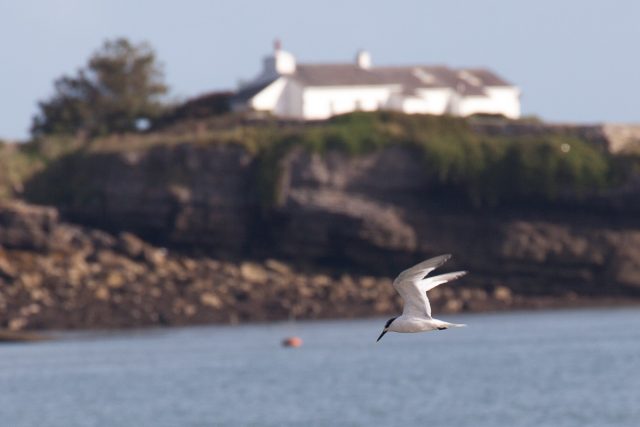· Anglesey ·
Down to the rocks with a brew in my battered Dewar flask first thing. Sunlight sparkled on the sea over towards Puffin Island, silhouetting a small boat whose occupant was checking his crab and lobster creels. A couple of hundred metres away, Sandwich terns fished in the bay, the distant sound of their soft plashes lagging a split-second behind the visible splash.

After breakfast, we took a walk along the coast, past the lifeboat station and the anglers on the point, to the windswept northerly headland, with its familiar view across the bay to Lligwy and Dulas. Turnstones turned stones on the beach. My first wheatear of the year landed on a nearby rock and obliged me with a photo-op. Stiff-winged fulmars soared effortlessly in the updraughts of the low, limestone cliffs. When we reached the pebble beach where Mum found glow-worms as a child, a grey seal popped its head out the water and observed us quizzically before retiring to a safer distance. We walked on to the site of the Royal Charter wreck before turning back. Another wheatear, three whitethroats (lesser whitethroats, I think), a lots of late-season butterflies.
After lunch of home-pressed beef and home-made pickled onions back at the caravan, I headed back down to the rocks. A lone ringed plover hunched on a rock near the rocky beach. It’s been several years since I saw one. There were plenty of cormorants, as usual, and quite a few Sandwich terns making their way, along the coast, into the wind, fishing as they went, their young crying plaintively to be fed. I took many, many photos, one or two of which might turn out to be in focus.
A posh meal at the Marram Grass restaurant in the evening, then back to the caravan. On Facebook, my friend Karen in Maine had mentioned the aurora borealis forecast was looking hopeful. I’ve never seen the Northern Lights, so I looked out for them shortly before bed. No joy, but the Anglesey stars were doing their astonishing, dark-skies magic. Once again, I experienced a sense of invertigo as I gazed in slack-jawed awe up into the Milky Way, with its myriad stars. How can it be we’ve come to accept the paltry number of stars we usually see in the night sky as normal? When I am emperor, light pollution will be a thing of the past.
Leave a Reply